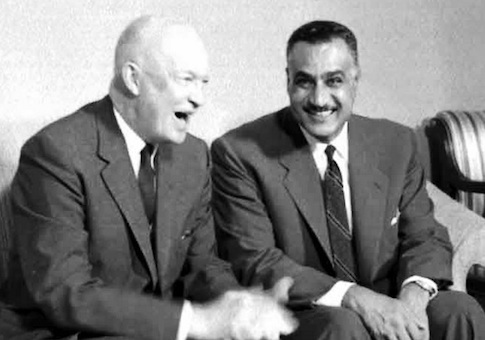At the outset of his 1995 book, The Arabists, Robert Kaplan makes the observation that what distinguished the British and American species of this odd, insular diplomatic genus was that the Brits had been imperialists, whereas the Yanks had got their start as missionaries. It is a revealing point. It is also a useful one to keep in mind while reading Michael Doran's new history of Eisenhower's Middle East policy, a tale that has at its center the transfer of regional authority from the British Empire to the United States. This transition climaxed, of course, in the drama of the 1956 Suez Crisis and Ike's refusal to back America's allies Britain and France, along with the young state of Israel, following their invasion of Egypt.
Polite analysis holds that Eisenhower's bold stance was the right move, signaling the end of the bad old colonial ways and the establishment of "the United States as the dominant, independent power in the Middle East," in the words of David Ignatius, as polite an analyst as they come. Doran—recently the author of a series of substantial articles forwarding the contrarian case that Obama's Iran deal, far from being something slapdash, was actually the centerpiece of a carefully planned rebalance of the U.S. posture in the Middle East—is less forgiving. So, in Doran's view, was Eisenhower himself, at least in the long run. Doran argues that Eisenhower had begun to see his uncompromising resistance to Britain's Anthony Eden and his co-conspirators as a mistake as early as 1958, and demonstrates that the ex-president had said almost as much to Israel's ambassador in 1967—even if he was loathe to make a public fuss about it.
Why the change of heart? What could be so wrong with a decision that made America the "dominant, independent power" in such a critical neighborhood? Well, for one thing, such a verdict leaves so much out as to be actively misleading. America did indeed supplant Britain as a result of Eisenhower's decision, but a consequence of greater significance was that the big winner of the crisis wasn't Ike but Nasser, who survived the blowback from his nationalization of the canal and cemented his status as the most important Arab leader of the day, the hero of Pan-Arab nationalism. For this favor, Nasser repaid Ike and subsequent administrations by continuing his already pronounced drift in the direction of the Soviets, demolishing the American plan to organize the Arabs against the communists and aiding the overthrow of pro-Western regimes like that of Hashemite Iraq.
Quite the price to pay, and quite the ironic reversal, to become the "dominant power." But for years Eisenhower, along with John Foster Dulles, his influential secretary of state, had organized their Middle East policy around the twin pillars of hostility to imperialism and skepticism of Zionism. In the view of these men, effective resistance to the Soviet Union could only be organized in the region if America were recognized not as yet another hegemon, but as an honest broker between Arab nationalists, Israel, and the slowly withdrawing Europeans.
Dulles, for his part, was given to lamenting that the influence of "international Jewry" in American politics stood in the way of such sound positioning. Eisenhower, for his, appears to have been prepared to lose a fair amount of ground to the communists in order to preserve America's reputation in the Third World. Doran quotes a never-published passage from the ex-president's draft of his memoirs, written in the early '60s, in which Ike remarks, apropos of his decision to let the French twist on the socialist rope at Dien Bien Phu, "Thus it is that the moral position of the United States was more to be guarded than the Tonkin Delta, indeed than all of Indochina."
Such zealousness—you might call it a missionary's faith in the value of fair dealing—astonished the more cynical Europeans who, though not without blind spots of their own, were at least less confused about the dangers posed by the Free Officers. The ambitious, manipulative Nasser enjoyed years of exploiting American ignorance before the Eisenhower administration came to understand that he had no interest whatsoever in peace with Israel, preferring instead to use the Jewish state as a foil and then manufacture his popularity as the leader of the resistance to Zionism into a cudgel with which to batter other Arab regimes. It is one of those depressingly frequent ironies of American history that Nasser's wildly successful intra-Arab propaganda campaigns relied on both equipment and training supplied by the CIA in the early '50s.
As Doran observes, the parallels between Eisenhower's approach to the Middle East and Obama's are rather obvious: just replace Egypt with Iran and a horror of European colonialism with a horror of American Cold War hegemony. All caveats understood, it is clear that the diplomatic philosophy that abetted the rise of Nasser remains in good standing in today's White House and among its allies, right down to the notion that such a woolly-headed investment in America's moral position somehow constitutes "realism."
But the Obama doctrine is on the way out. What lessons might Donald Trump's national security appointees, who are expected to bring a harder-edged version of realism to the business of foreign affairs, take from this book? To remember who America's true friends are, perhaps, and to keep in mind that even if these friends miscalculate or misbehave or disappoint, tossing them aside may only benefit our enemies.
